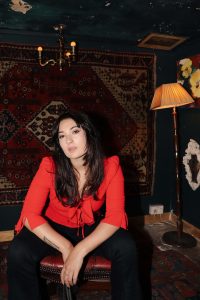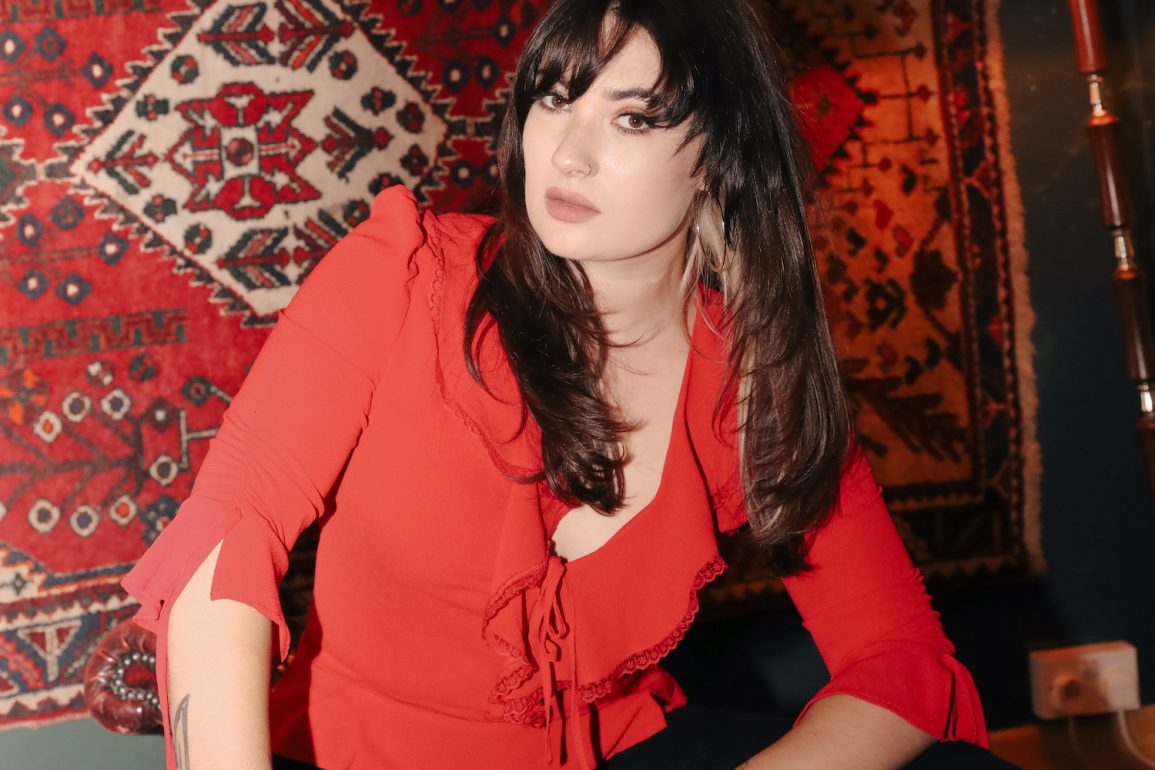OZ interview – When you start playing music at a young age, it’s easy to get lost along the way. In an industry that often puts profits above its artists’ feelings, it’s easy to feel like a cog in the machine rather than an independent artist in your own right.
Luckily for Croydon-native Olivia Sebastianelli – who performs under the moniker OZ – her journey through music has allowed her to come through the other side and do what she wants to do. Having worked as a songwriter for other artists, she is now finding her own voice, building upon the lessons she has learnt throughout her career to fashion a path of her own.
With her forthcoming EP ‘Jupiter’ set to be released October 30th, OZ has crafted her alternative-pop sound. The last track released, “Foot Down”, even has some country vibes throughout it, and OZ’s self-assured vocals further demonstrate her energy and eclectic well of inspiration.
I chatted with OZ about her new tracks, working in Nashville and maintaining authenticity within social media.

P: Hi, nice to see you. How’s pandemic life?
O: Pandemic life is fine! I’ve been writing and managing to work. It’s been pretty normal really.
P: I guess if you’ve got stuff to work on from home it’s not too difficult to deal with, right?
O: Yeah definitely, I’ve realized aside from going to shows I don’t have any form of social life! All my social life is going to watch bands so aside from that I don’t leave the house much. I think part of the joy of going to shows is being around other people and in small places with all your friends and doing it at home just doesn’t have the same energy.
P: I loved the new track “Foot Down”. What does this track mean to you?
O: It sounds ridiculous, but I did have really low expectations – it was more a case of putting it out for me, so to see people actually listening to it was great! It’s basically my ‘go-get-em song’ – throughout my career, I’ve always had people tell me ‘your music doesn’t really fit anywhere cause it’s not pop, it’s not rock, it’s not this, not that and we don’t know where to put you’, so I wanted to write a song to defy the ‘no’s’ I’d had in my career saying ‘well I’m gonna make the music I want to make and you’re not going to tell me not to’.
P: Do you think that attitude is eroding?
O: I think when I was growing up you really had these musical tribes – the music you listened to really defined who you are in terms of your style and probably your personality – you were very separate. And I think now with things like Spotify, Apple Music and these editorial playlists as well as being able to create your own playlists it has all blended and you don’t have those really defined tribes; you can be a person that listens to Britney and Alice In Chains.
P: There seems to be some country influence on the new EP – where did that inspiration come from?
O: I think growing up listening to a lot of country and bluegrass obviously instilled this way of working melodies. Strangely, I’ve always had this sort of southern twang to my vocals, it’s not something I try to do but it just sort of comes out, which is pretty strange!
P: I know you went out to make music in Nashville, Tennessee. Tell me about that experience.
O: They work so quick! That’s one thing I love about them, they don’t overthink everything, they have this natural ability to tell a story and it’s so quick but so well-crafted. A friend of mine told me that you never write a gun into a story unless you’re willing to fire it and that clicked with me – why would you write something into a song that is irrelevant if you’re not going to give it the pay off in the end, and it sums up their writing in Nashville.
P: When you’re writing music do think of it more like you’re writing a full ‘record’ or do you look at each teach individually?
O: I am a firm believer in an album – you can have a concept album or this beautiful flow through an album so I tend to go into the process thinking this has to come out as a body of work, so I try to have something that glues everything together. Plus, as a songwriter, there are so many songs I write that I love but don’t represent me as an artist. So I do have to wear two different hats as ‘Olivia Songwriter’ and ‘OZ’. But I definitely go in as OZ thinking it’s gonna be a whole record.
P: It feels that with everything becoming so digitized – especially in light of COVID-19 – that authenticity is really hard to find. How do you navigate the digital landscape without losing your own authenticity?
O: I think I just try to keep it as real as possible and when I’m not keeping it real I go completely the other way – rather than put like a pretty filter on my face I’ll do something a bit madder. Otherwise, it just gets fucking boring, you need something to change it up a little bit. I just like to try and do things that are a little bit interesting and different but ultimately be honest – I am awkward on camera and like taking selfies make me uncomfortable so I try to do it as honestly as possible. That’s why I’ll often put in my captions on Instagram that I’m so embarrassing because, in reality, I am! I think what’s also missing from social media is that now we want instant gratification and we don’t see the hard work that’s gone into things – like how hard it is to get followers or make a video – so I think showing the struggle of it is really important.
P: How do you show the craft behind what you do?
O: Well I’m compiling little videos of making the latest record – but obviously I don’t wanna bore people with it unless you’re a tech nerd! But it’s long days and it’s long evenings, early mornings and late nights where you’re having to consistently think of ideas, but for me, the craft of it is kind of accidental which I think is part of the fun. We go in, we have loads of tea and biscuits and we plug different things in and just see what happens. It’s a lot of experimentation and mucking about but it’s still putting the time in. But also having a great team around you is really important – my team is almost all female too which is kind of a different perspective for the industry!
P: Obviously the music industry is in a bit of an existential crisis in the light of the experiences of women within it. How do you feel now compared to when you started as a teenager?
O: I think it has changed for the better for a lot of ways. When I first started the industry was already in a weird place with things like Spotify just starting out and YouTube was becoming more popular. And I think now the industry has gotten itself together a bit – they’ve started to work out what’s viable and what’s not. I think with Spotify what is great is that you do have the freedom to just upload your music and people can find it. Whereas when I was on a label they were much more concerned with being a personality than the music you were putting out into the world. I do feel more confident with the industry – I’ve definitely been through the wringer with it but I have a lot more faith in it now.
P: I guess to have gone through those experiences have allowed to get to where you are now.
O: I always joke that all my friends went to uni and I went to a finishing school for the music industry. I learnt a lot about myself, about how the business works, who are valuable in terms of partners and what makes a good team. The biggest lesson that I learnt was that signing a record deal is not the be-all and end-all. If you can get signed to a major label and they will support, you then it can be a wonderful experience. Mine was a lot more complicated than other people’s, but at the same time you can make a decent living releasing music independently and you have total control over what you’re doing and if it fails, you’ve only got yourself to blame! There are pros and cons and I’ve learnt that it can be like stumbling through the dark so you’ve got to just trust your vision and ultimately believe in yourself – because if you can’t then no one else will.
PRV


